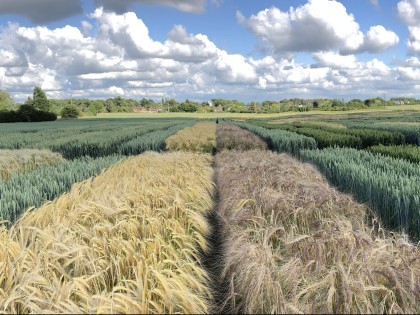United Kingdom
2 Feb 2024

The genetic resources behind some of the most important plant traits driving agricultural crop production are being made easier to access by researchers with the development of open-source genomic tools.
The project will focus on seven plant species of high relevance to UK researchers: arabidopsis, barley, oat, oilseed rape, rice, tomato and wheat. The aim is to integrate, analyse and add value to existing plant population DNA sequence data in a user-friendly, browsable genomic context, ultimately opening up opportunities in crop research innovation.
Funded by the Biotechnology and Biological Sciences Research Council (BBSRC) the £1.2 million ‘Ensembl Plant Populations’ project will be led by the UK-based research organisations NIAB and EMBL’s European Bioinformatics Institute (EMBL-EBI), finishing by October 2026.
These new capabilities will be hosted within the already established ‘Ensembl Plants’ online open-source web platform, used by crop researchers around the world. The new integrated pipeline will empower users to conduct statistically rigorous analyses on genetically diverse biological populations. It also enables direct bioinformatic exploration of resulting genetic regions through enhanced ‘Ensembl Plants’ genomic and variant data resources and tools.
Dr Sarah Dyer, overall project lead at EMBL-EBI, highlights that the United Kingdom has unique strengths in the realms of plant genomics, germplasm resources, and genetic trait dissection. “However, bridging the gap between these fields has historically presented challenges, demanding substantial technical expertise from researchers. ‘Ensembl Plant Populations’ aims to provide a cohesive platform for integrated genetic and genomic analyses. Essentially, this funding will enable a significant leap forward in our ability to explore the genetic basis of important plant traits.”
Dr James Cockram, principal investigator at NIAB, explains that ‘Ensembl Plant Populations’ will help lower the barriers to dissecting the genetic and genomic features that underpin crop traits, and encourage the use of the wealth of germplasm and DNA resources available to plant researchers.
“By providing a unified platform for research and analysis, ‘Ensembl Plant Populations' promises to empower scientists across the UK and beyond with tools and resources that will help accelerate innovation in plant genomics. The project exemplifies our collective efforts to advance agricultural and biological sciences, ultimately contributing to sustainable agriculture and food security,” finishes Dr Cockram.
